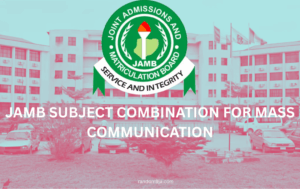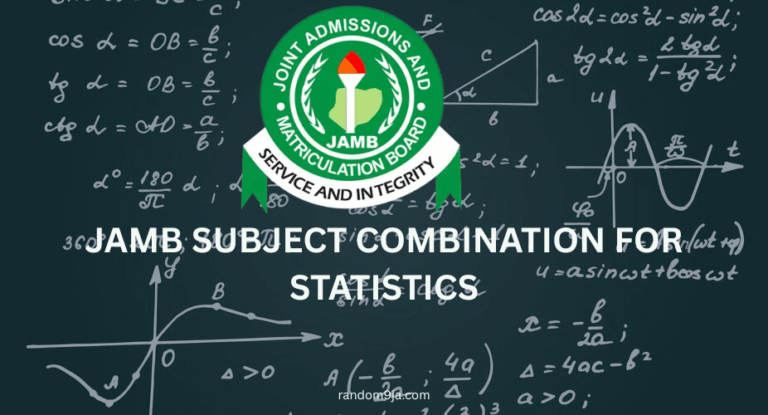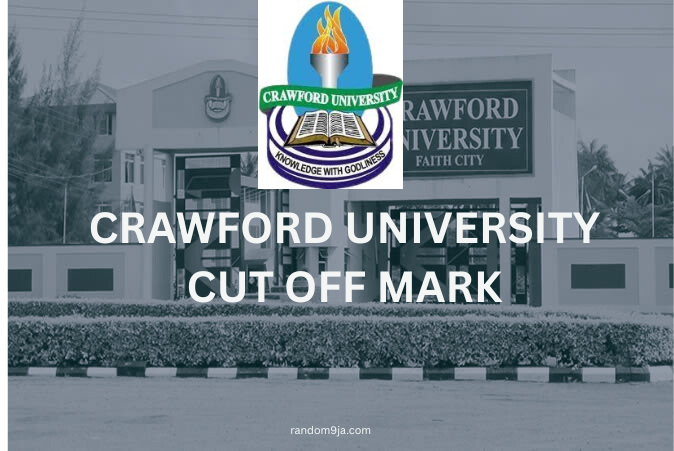JAMB Subject Combination for Mass Communication 2026/2027

Mass Communication is one of the most popular courses among Nigerian students, especially those interested in media, journalism, broadcasting, public relations, and digital communication. Every year, thousands of UTME candidates apply for Mass Communication in universities across Nigeria. Unfortunately, many lose their admission opportunities simply because they chose the wrong JAMB subject combination or failed to meet basic admission requirements.
Choosing the correct subject combination is a critical step in the admission process. The Joint Admissions and Matriculation Board (JAMB) is strict about subject requirements, and universities will not admit students who do not meet the stated criteria—even if their scores are high. This is why understanding the accurate JAMB subjects, O’level requirements, and Direct Entry qualifications is essential.
In this comprehensive guide, you’ll learn the correct JAMB subject combination for Mass Communication, admission requirements, the best universities offering the course, job opportunities, and helpful tips for gaining admission easily.
What Is Mass Communication?
Mass Communication is the process of creating, delivering, and exchanging information with large audiences through various media platforms such as radio, television, newspapers, magazines, advertising, social media, and digital technologies. The course equips students with journalism skills, communication techniques, media research abilities, content creation knowledge, and public relations strategies.
As society becomes increasingly digital and interconnected, the need for communication experts continues to grow. Mass Communication students are trained to shape public opinion, share credible information, create engaging content, influence behavior, and manage crises in corporate and social environments.
Why Study Mass Communication?
There are several reasons why Mass Communication is one of the most sought-after programs in Nigeria:
-
It gives students the opportunity to work in the media industry—television, radio, newspapers, online platforms, and advertising agencies.
-
It is a highly practical and creative field suitable for people with strong communication skills.
-
Graduates can work in offices, newsrooms, studios, and even remotely.
-
The course opens opportunities in journalism, broadcasting, film production, social media, content creation, public relations, and marketing.
-
The rise of digital media has increased job opportunities for content creators, influencers, bloggers, podcasters, and digital strategists.
-
Mass Communication graduates can work in government agencies, PR firms, NGOs, multinational companies, political campaigns, and corporate organizations.
-
The field also offers excellent opportunities for self-employment.
If you love writing, speaking, storytelling, media production, public relations, social media, or digital marketing, Mass Communication is an excellent career choice.
Correct JAMB Subject Combination for Mass Communication
The official JAMB subject combination for Mass Communication is as follows:
-
English Language (Compulsory)
-
Literature in English
-
Government or History
-
Economics / CRS / IRS / any other Arts or Social Science subject
Most universities accept any of the subjects listed above, but the safest and most widely accepted subject combination is:
English, Literature, Government, and CRS/IRS or Economics.
Some universities prefer CRS/IRS while others prefer Economics or any social science subject. However, Literature in English is compulsory for almost all institutions offering Mass Communication.
WAEC/NECO/NABTEB O’Level Requirements for Mass Communication
To be admitted into the Mass Communication program, students must have at least five (5) credit passes in their O’level results. These subjects must be obtained in not more than two sittings.
Below are the essential subjects:
-
English Language (Credit)
-
Mathematics (Credit)
-
Literature in English (Credit)
-
Government / History
-
Economics / CRS / IRS
-
Any other relevant Arts or Social Science subject
Some universities may be flexible with Literature or Government, but English and Mathematics are compulsory for all.
Direct Entry Requirements for Mass Communication
Students applying for Direct Entry admission into 200 level must have one of the following qualifications:
-
Two A’level passes in Arts or Social Science subjects (preferably Literature and Government).
-
NCE, ND, or OND in Mass Communication, Journalism, or any related field (usually Upper Credit).
-
HND holders may be admitted into 300 level depending on university policies.
-
JUPEB/IJMB with good grades in relevant subjects.
Direct Entry applicants often have an added advantage during screening because of their previous educational background.
Cut-off Mark for Mass Communication
Different universities set different cut-off marks for Mass Communication. However, below is a general guideline:
-
Federal Universities: 200–250
-
State Universities: 180–210
-
Private Universities: 150–180
To increase your chances of admission, aim for at least 220 and above, especially for competitive universities like UNILAG, UI, UNN, and LASU.
Top Universities Offering Mass Communication in Nigeria
Many Nigerian universities offer either Mass Communication or related programs such as Communication Studies, Media Studies, Journalism, Public Relations, and Communication Arts.
Here are top institutions offering Mass Communication:
Federal Universities
-
University of Lagos (UNILAG)
-
University of Nigeria, Nsukka (UNN)
-
University of Ilorin (UNILORIN)
-
Obafemi Awolowo University (OAU)
-
Ahmadu Bello University (ABU Zaria)
-
University of Benin (UNIBEN)
-
University of Uyo (UNIUYO)
-
Nnamdi Azikiwe University (UNIZIK)
State Universities
-
Lagos State University (LASU)
-
Imo State University (IMSU)
-
Rivers State University (RSU)
-
Delta State University (DELSU)
-
Ekiti State University (EKSU)
-
Abia State University (ABSU)
Private Universities
-
Covenant University
-
Babcock University
-
Bowen University
-
Caleb University
-
Madonna University
-
Igbinedion University
-
Lead City University
Most of these universities offer highly rated Mass Communication programs with modern facilities such as radio studios, TV studios, and multimedia labs.
Skills You Need to Succeed in Mass Communication
To succeed academically and professionally as a Mass Communication student, the following skills are essential:
-
Excellent writing ability
-
Strong speaking and listening skills
-
Creativity and innovation
-
Ability to research and analyze information
-
Good understanding of digital media
-
Time management
-
Photography and video editing skills
-
Confidence and public speaking ability
-
Critical thinking and problem-solving skills
-
Creativity for content production
Most Mass Communication jobs require creativity, accuracy, and proper use of language, so developing these skills early will give you a huge advantage.
Common Courses Studied in Mass Communication
During your time as a Mass Communication student, you will study a variety of theoretical and practical courses such as:
-
Introduction to Mass Communication
-
News Reporting and Writing
-
Public Relations
-
Advertising
-
Broadcast Journalism
-
Film Studies
-
Media Law and Ethics
-
Development Communication
-
Photojournalism
-
Multimedia Production
-
Script Writing
-
Digital Journalism
-
Radio and Television Production
-
Communication Research
-
Online Media and Blogging
-
Media Management
These courses help students understand both traditional and modern communication systems, preparing them for the dynamic media world.
Career Opportunities for Mass Communication Graduates
Mass Communication offers one of the widest career opportunities in Nigeria and globally. Graduates can work in virtually all sectors, including government agencies, media houses, private companies, NGOs, and international organizations.
Common career paths include:
-
Journalist
-
Radio/TV Presenter
-
News Reporter
-
Broadcaster
-
Social Media Manager
-
Public Relations Officer
-
Brand Strategist
-
Digital Marketer
-
Content Creator
-
Blogger/Vlogger
-
Copywriter
-
Film Producer
-
Photographer
-
Advertising Executive
-
Media Researcher
-
Event Manager
-
Communications Officer
-
Press Secretary
-
Political Spokesperson
-
Media Consultant
-
Podcaster
With the rise of digital media, Mass Communication graduates can also work as:
-
YouTubers
-
Influencers
-
Online Radio Hosts
-
Podcast Creators
-
Digital Content Creators
They can also start their own businesses in media production, advertising, content creation, or PR consulting.
Challenges Students May Face in Mass Communication
Below are some common challenges and how to overcome them:
-
Heavy coursework: Take good notes, join study groups, and attend lectures regularly.
-
Practical assignments: Learn basic photography, video editing, and digital tools.
-
Fast-paced industry: Keep up with trends in media and communication.
-
Competition: Build your portfolio early through internships and freelancing.
-
Public speaking: Practice regularly to boost confidence.
Tips to Gain Admission to Study Mass Communication
Follow these expert-recommended strategies to increase your chances:
-
Choose the correct JAMB subject combination—English, Literature, Government, and CRS/Economics.
-
Aim for a score above 220 if applying to competitive universities.
-
Prepare well for Post-UTME, especially subjects involving comprehension and essay writing.
-
Get at least 5 credit passes in O’level, including English and Literature.
-
Choose a less competitive university if your score is low.
-
Use past questions for both JAMB and Post-UTME.
-
Build communication skills early, especially writing and speaking.
-
Stay updated via JAMB CAPS, school portals, and news sites.
Read Also: JAMB Subject Combination for Home Science, Nutrition and Dietetics 2026/2027
Choosing the correct JAMB subject combination for Mass Communication is the first step toward achieving your dream of studying this exciting and dynamic course. The approved subjects, English, Literature, Government, and CRS/Economics, are essential for meeting university admission requirements and forming a strong academic foundation.
Mass Communication offers one of the most diverse career paths in Nigeria, with opportunities in journalism, broadcasting, digital media, advertising, public relations, and many more. With the right preparation, good scores, and a strong passion for communication, you can secure admission into your preferred university and build a rewarding career in the media industry.





